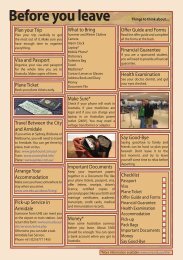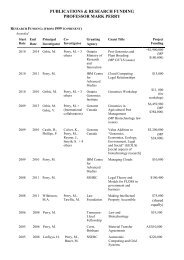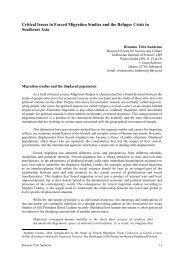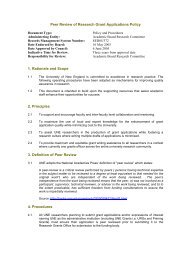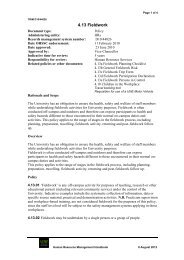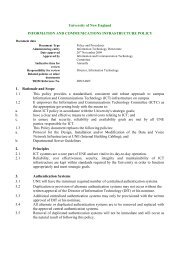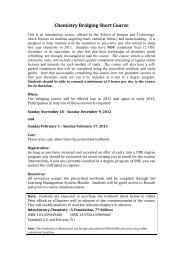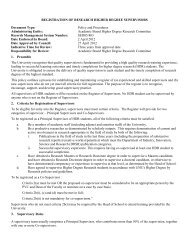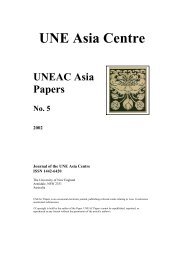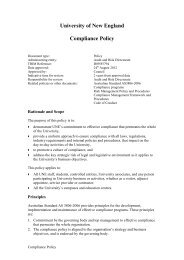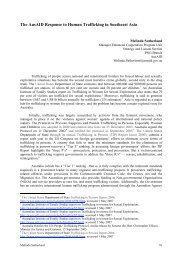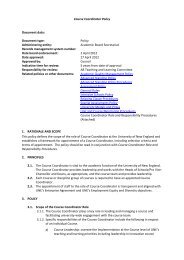International Student Handbook - University of New England
International Student Handbook - University of New England
International Student Handbook - University of New England
You also want an ePaper? Increase the reach of your titles
YUMPU automatically turns print PDFs into web optimized ePapers that Google loves.
Australian Communications and Media Authority E-mail sfoaregister@acma.gov.au.<br />
Telecommunications Industry Ombudsman Tele: 1800 062 058<br />
E-mail: tio@tio.com.au<br />
Coping with Life in Australia<br />
Homesickness<br />
When you come a great distance from another country adjusting to study and life might be difficult for<br />
you. You have to deal with a different language, strange food, a different climate and an unfamiliar<br />
landscape. And home is so far away; arranging to go home for a weekend is not a possibility for you.<br />
We have an idea <strong>of</strong> what it may be like for you, and are here to help. Be patient with us if our attempts<br />
to help seem odd in terms <strong>of</strong> your culture. The experience <strong>of</strong> moving into another culture is sometimes<br />
described as „culture shock‟.<br />
It is important to be aware <strong>of</strong> homesickness as a normal process which you may go through. It is a time<br />
<strong>of</strong> letting go. You are not alone in this experience – research shows that nearly 70% <strong>of</strong> students feel<br />
homesick at some time with most saying it lasted for 1 week and for others several weeks.<br />
Homesickness can include<br />
o Being miserable without knowing why<br />
o Feeling like a prisoner in your own room<br />
o Being unable to get into a comfortable routine<br />
o Not liking meals<br />
o Wondering what people at home are doing; feeling as if you are missing out<br />
o Wanting to go home straight after you have arrived<br />
o Not liking to come back after a holiday<br />
o Thinking you are the only person with homesick feelings<br />
o Being unable to settle into anything and crying for no reason<br />
o Finding the values <strong>of</strong> people around you strange and vaguely threatening<br />
o Getting fed up with new food, new smells, new scenery, and wanting the familiar<br />
Homesickness Survival Tips<br />
o Set your room up with something familiar from home<br />
o It is hard to let go <strong>of</strong> home, but ringing home too <strong>of</strong>ten in the first few weeks can prolong<br />
homesickness<br />
o Make an effort to talk to someone new and make the most <strong>of</strong> your time here<br />
o Get involved in activities<br />
o Talk to someone else about how you feel and make use <strong>of</strong> the support that is available here<br />
o Say yes to invitations from others to places or events where you will meet more people. If<br />
you are unsure about what to do or wear, ask.<br />
o If you have been involved in a religious or other group at home ask if there is one nearby<br />
o Be kind to yourself – it is OK to miss home and perfectly normal. After all, you have spent<br />
most <strong>of</strong> your life there until now, so tears can be cleansing.<br />
These suggestions may be all the help you need, but if your homesickness doesn‟t seem to be getting<br />
better or is interfering with your life or stopping you from getting into a new routine, please ask for help<br />
from the <strong>Student</strong> Services staff.<br />
UNE-ISBT 2009-2010 <strong>International</strong> <strong>Student</strong> <strong>Handbook</strong> Page 22



